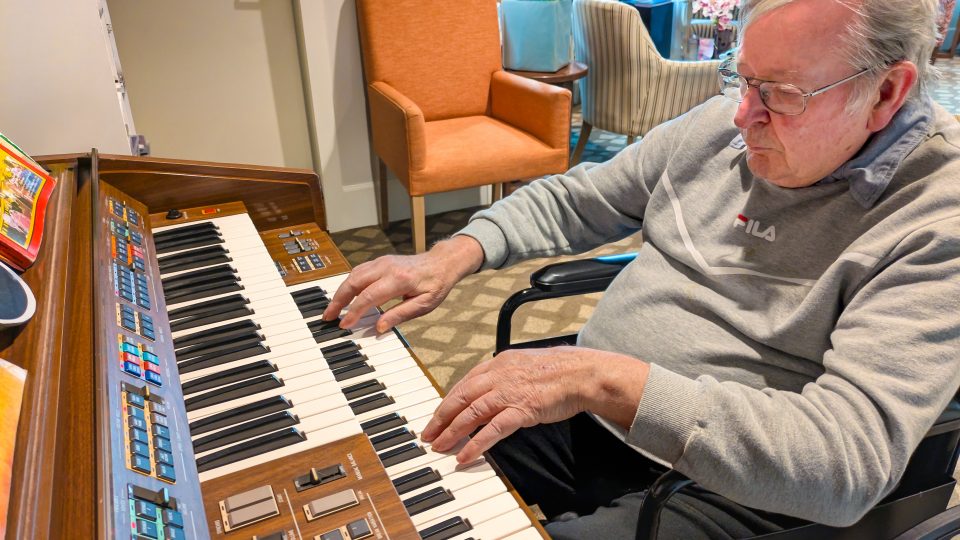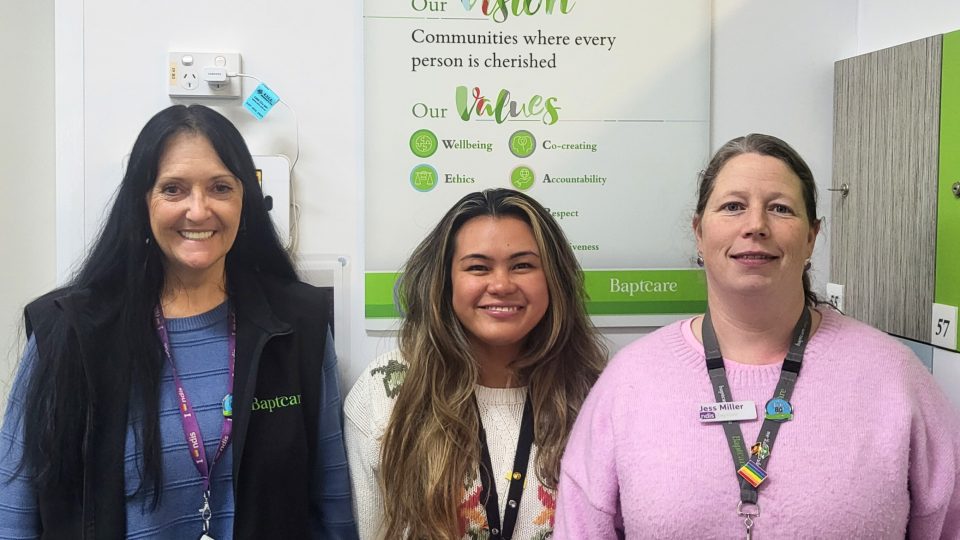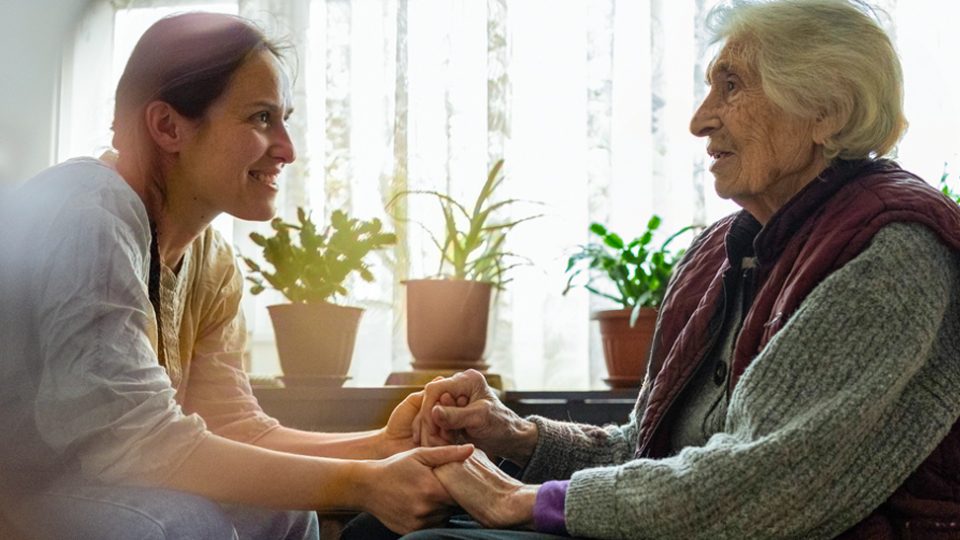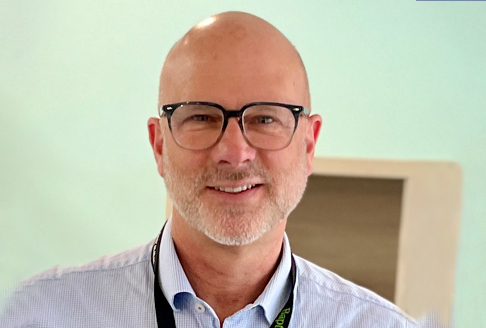As Spiritual Care Week draws to a close, we sat down with James Lewis, our Acting Head of Spiritual Care to ask him about his career path to Baptcare, how he originally wanted to be a psychologist (but ultimately married one instead!) and how he cherishes his current role because it allows him to help people.
What is your current role and what does it involve day to day?
Acting Head of Spiritual Care. This involves advocating and articulating the value of Spiritual Care to our organisation, managing financial resources, leadership of the Spiritual Care team members including Supervisors, co-creating resources to offer high quality spiritual care practice across the organisation, co-creating strategy for strengthening Baptcare’s alignment with its Mission, Values and Baptist heritage, and being a Spiritual Care presence in the Camberwell office.
How long have you been working within the Spiritual Care team at Baptcare?
I joined Baptcare in 2016 as Chaplain at Wyndham Lodge Residential Aged Care community. I loved working as a Spiritual Carer amongst the community there. In 2019 I moved to a manager role, supervising Spiritual Care staff across Victoria and Tasmania. Caring for the carers is something close to my heart. For the last five months I have been Acting Head of Spiritual Care.
What do you like about working with Baptcare and in the Spiritual Care space?
Every day is an opportunity to journey beside people and get to know their life journey. You need to pay attention to the sources of wisdom, courage, faith and hope that will sustain and inspire them. The Spiritual Care team has the privilege and responsibility of hearing some of the most wonderful and heartbreaking stories. It is a sacred space of high trust and respect. It is also a creative space because often the seeds of new growth are planted in those reflective moments. It is very rewarding work: helping people to make sense of their circumstances and draw on resources that will help them be resilient and mature.
How would you describe the role of spiritual care at Baptcare?
It is the practice of whole-person-centred care for all customers, family members and staff in our organisation. Spiritual care is not limited to any specific religion or belief system. It respects the diversity and uniqueness of each person’s spirituality and does not impose any doctrine or agenda. Rather, it seeks to understand and honour each person’s experience and spiritual perspective and to support their exploration and expression of it. Spiritual care can involve listening, talking, praying, meditating, reading, singing, or engaging in rituals or ceremonies that are meaningful to the person.
The theme of this SCW is Spirituality and Mental Health with the overriding message being ‘It’s healthy to get help.’ How does your spiritual worldview impact on your mental wellbeing?
My spiritual worldview is shaped by my Christian faith. I believe all people are made in the image of a loving God and are made for relationships. We all have fragility and times of despair, but community is where we can find ourselves understood, affirmed and strengthened. As a follower of Jesus, it has been helpful to remember that Jesus was human: he got angry, was moved to tears and lamented things that disappointed him. He journeyed with a community of people, and he also made time for personal prayer and reflection. Bottling up emotions is not healthy for me or the people I live and work with. I need to share vulnerably, to connect with others and de-isolate when I am struggling. I use a journal to reflect on the stresses I am carrying and blessings I’m grateful for. And I pray lots as I swim.
Can you share a particularly special workday/customer interaction you’ve had recently?
I held the front door open for a colleague who was entering and realised we had not spoken for more than a year. I asked how they were going and listened as they shared some really challenging and complex experiences they had endured. I gave the person some safe space to reflect on the unexpected nature of the changes that had happened. It wasn’t a long conversation but at the end the person acknowledged it was a really fortuitous moment for them to reflect and debrief. They felt ‘seen’ and ‘heard’ in the challenges. I was grateful for the opportunity to offer that safe space.
Did you always want to work within the Spiritual Care space and what are some other jobs you’ve performed in your career?
I’ve been a secondary school teacher (English and Psychology), a Baptist pastor and lecturer at Whitley Theological College.
What did you want to be when you grew up?
A psychologist – I knew I wanted to help people. I completed a Bachelor of Behavioural Science but didn’t get high enough grades in statistics to do Honours, so I completed a Dip. Ed to teach psych as a schoolteacher (and then married a psychologist!)
Can you tell us two surprising things about yourself?
- I swam across the Rip from Pt Nepean to Pt Lonsdale, which was a pretty amazing experience. (See photo of James in swimming action).
- I’m a country music fan, especially the contemporary artists, which is probably nostalgia for my childhood growing up on a farm.
We have enjoyed seeing many of your fabulous photos over the years in Insight. Do you have a favourite photo you’d like to share and tell us a bit about it?
I love taking photos of nature. This was a random time when a Point Roadknight wave made a circle in the air as it hit the rocks. The moment was playful and beautiful. The photo became a prayer of gratitude.
Do you have a favourite quote or motto in life?
‘To breathe peace into the world, first disarm your own heart.’
Please complete this sentence: An ideal weekend for me involves….
An early morning swim with some friends and family, seeing dolphins and beautiful sunlight rippling on the ocean floor, followed by coffee and croissants, a good book and an arvo nap.
If you could sit next to someone at a dinner party, who would it be and why?
Eugene Peterson – a wonderful pastor, poet and theologian who loved God and people in equal measure. He wrote the bestseller paraphrase of the Bible called ‘The Message’ and treasured words as gifts. He had a keen sense of the privilege of spiritual leadership and the corresponding need for humility. He loathed religion when it was packaged as a product for consumption and was fierce in his critique of Christianity when it was self-absorbed rather than gracious in its vision of faith, hope and love for all. He inspires me to be true to my calling, courageous about values and always a learner.
Thank you, James, for your inspirational leadership and gracious care at Baptcare. We are blessed to have you in our community.
You can learn more about Spiritual Care at Baptcare on our website.
Community news
-

Wyndham Lodge Choir
Every Tuesday afternoon, residents gather in the sunny music room at Baptcare’s Wyndham Lodge Residential Aged Care community to sing together.
- 25 Jun 2025
-

The Green Team at Moonah Hub
The Sustainability Team, known as ‘The Green Team’, are based at Baptcare Moonah Hub in Hobart and are all about promoting environmentally friendly and sustainable practices in their office, the wider organisation and the local community. We asked Jess Miller, their enthusiastic and determined leader, all about the team and what they do. Read more below!
- 11 Jun 2025
-

Tips for addressing depression in older adults
Our post-retirement ‘golden years’ are often portrayed as a time of relaxation and enjoyment with plenty of time on our hands to enjoy the things we love. However, for many older adults this period can be overshadowed by struggles with depression.
- 05 Jun 2025

